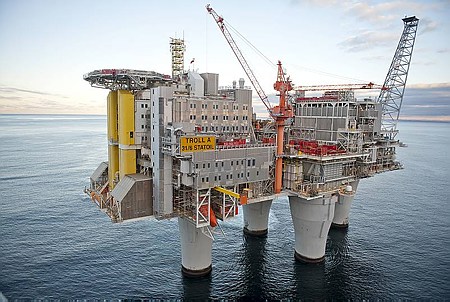EU officials are reportedly turning their wistful glance to Norway’s enormous oil fund, wondering whether there’s a way it can help ease Europe’s debt crisis. Fueled by Norwegian oil revenues and poised to keep growing, the fund is viewed as a possible source of capital at a time when Norway’s European neighbours are finding it hard to make ends meet.

“Both the Norwegian oil fund and Chinese money are interesting in a discussion on who has resources to offer during Europe’s debt crisis,” Swedish Prime Minister Fredrik Reinfeldt told the Brussels correspondent for Norwegian newspapers Adresseavisen, Bergens Tidende and Stavanger Aftenbladet.
Reinfeldt noted that there’s a discussion going on about “who has resources in the world” at present. “Then both the Chinese and the oil fund and everything possible is mentioned,” Reinfeldt said. He said, however, that nothing is imminent. It would be “a later step,” he said.
Strengthening Europe’s own fund
EU leaders met during the weekend to see how they can strengthen the euro zone’s own back-up fund, the EFSF (European Financial Stability Facility), also by expanding its realm of possible investors. Norway’s sovereign wealth fund, where the Norwegian government has been saving instead of spending its petrokroner, is currently valued at around EUR 388 billion and thus in a position to save many debtor nations, acknowledged Professor Ola Grytten at the Norwegian business school NHH in Bergen.
“But I don’t see why we should do that, unless it’s a lucrative investment,” Grytten said. “There would have to be large guarantees. I think there’s great danger for major losses.”
The oil fund already has invested in EFSF, taking part in a EUR 5 billion issue in January, and indicated on Monday that it may buy more European debt. Øystein Sjølie of Norway’s central bank told news bureau NTB that “we will evaluate (EFSF) again based on usual criteria like expected risk and return.” Finance Minister Sigbjørn Johnsen, ultimately in charge of the oil fund, said he was also willing to evaluate further contributions to the European crisis fund.
Oil fund debate
Political debate continues in Norway over how money in the oil fund is used, with calls often going out for more money from it to improve everything from Norwegian roads to schools to health care. Instead the fund is mostly invested overseas, in stocks and, most recently, some high-end real estate in London and Paris.
Most political parties, with the noted exception of the conservative Progress Party, want to continue limiting actual spending from the fund to just 4 percent of its size per year, to avoid inflation in the otherwise relatively small Norwegian economy and to save oil revenues for the day when Norway’s oil may run out.
Warnings that North Sea wells were running dry, however, have been put off for at least 30 years after recent discoveries of huge and relatively easily accessible new oil and gas reserves off the southwest coast. That means lots more money is likely to pour into the oil fund over the next several decades.
The EU meeting over the weekend resolved to ask countries with a budget surplus and positive trade balances for help during the crisis. Norway, which is not a member of the EU but keen to play a major role internationally, now seems likely to be among those on their list.
Views and News from Norway/Nina Berglund
Please support our stories! You can do so by clicking on the “Donate” button now:

